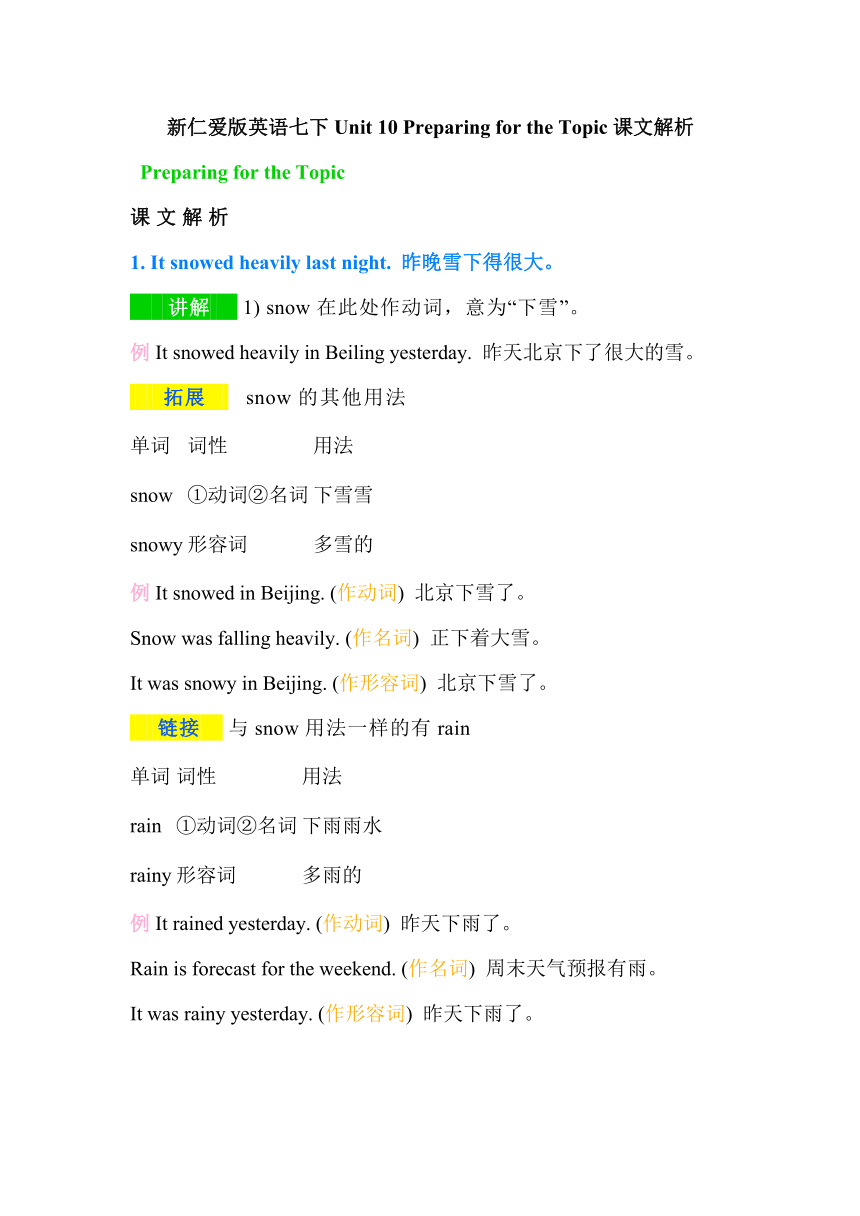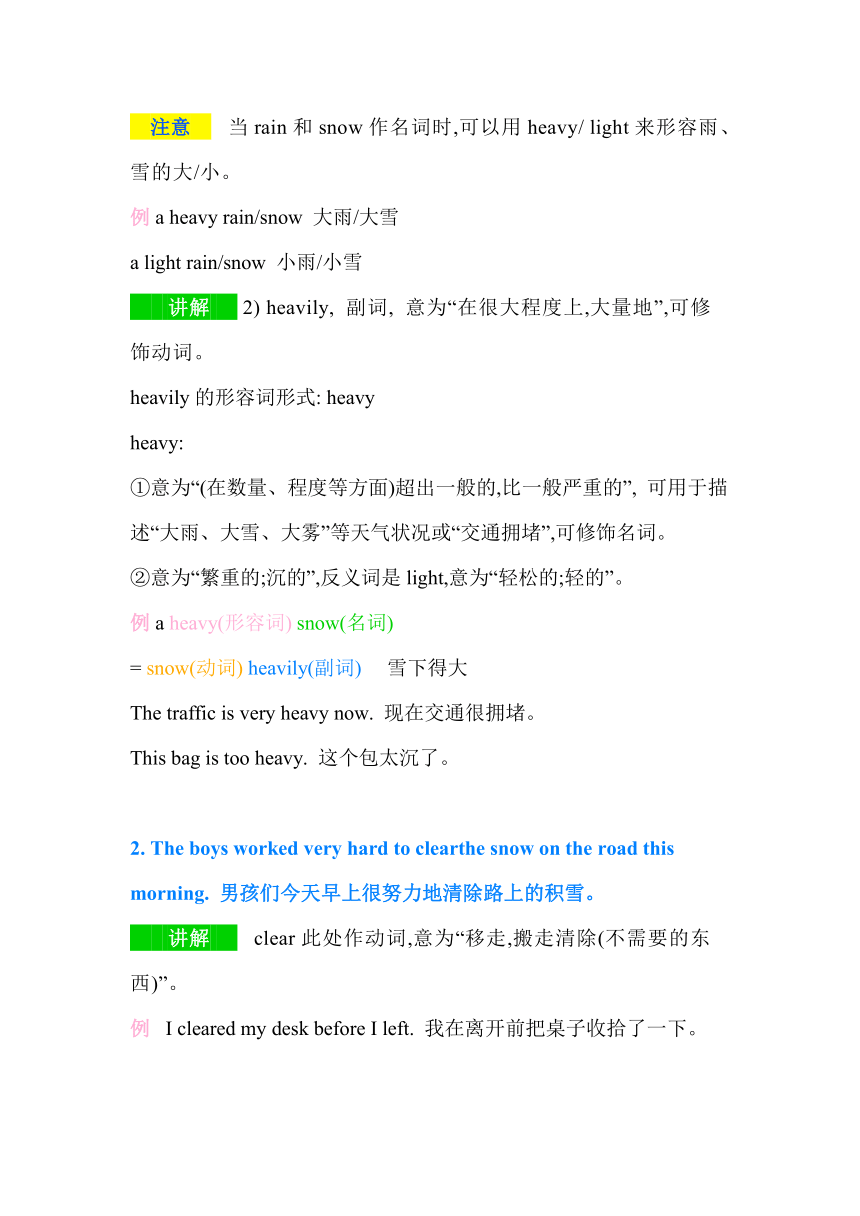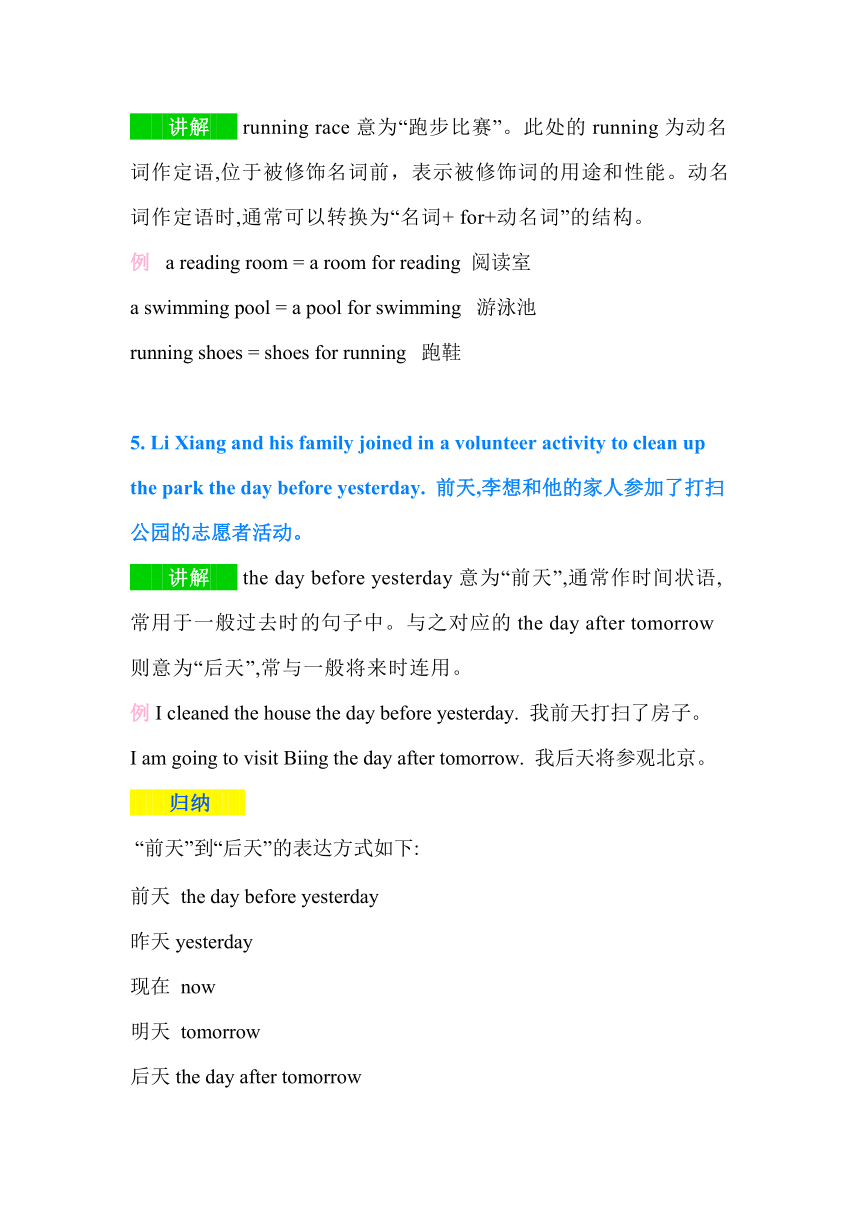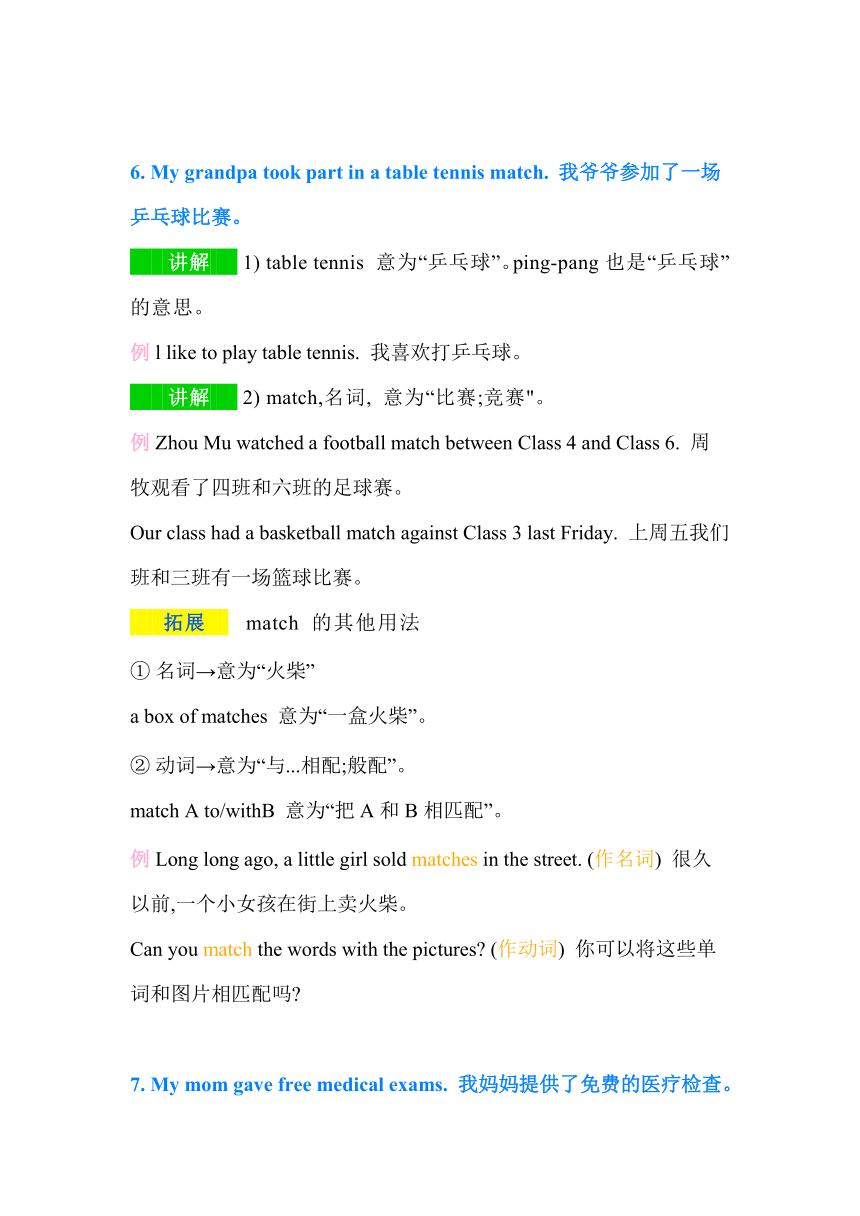新仁爱版英语七下Unit 10 Lending a Helping Hand Preparing for the Topic课文解析
文档属性
| 名称 | 新仁爱版英语七下Unit 10 Lending a Helping Hand Preparing for the Topic课文解析 |  | |
| 格式 | docx | ||
| 文件大小 | 27.7KB | ||
| 资源类型 | 教案 | ||
| 版本资源 | 仁爱科普版 | ||
| 科目 | 英语 | ||
| 更新时间 | 2025-05-30 19:33:54 | ||
图片预览





文档简介
新仁爱版英语七下Unit 10 Preparing for the Topic课文解析
Preparing for the Topic
课文解析
1. It snowed heavily last night. 昨晚雪下得很大。
讲解 1) snow在此处作动词,意为“下雪”。
例 It snowed heavily in Beiling yesterday. 昨天北京下了很大的雪。
拓展 snow的其他用法
单词 词性 用法
snow ①动词②名词 下雪雪
snowy 形容词 多雪的
例 It snowed in Beijing. (作动词) 北京下雪了。
Snow was falling heavily. (作名词) 正下着大雪。
It was snowy in Beijing. (作形容词) 北京下雪了。
链接 与snow用法一样的有rain
单词 词性 用法
rain ①动词②名词 下雨雨水
rainy 形容词 多雨的
例 It rained yesterday. (作动词) 昨天下雨了。
Rain is forecast for the weekend. (作名词) 周末天气预报有雨。
It was rainy yesterday. (作形容词) 昨天下雨了。
注意 当rain和snow作名词时,可以用heavy/ light来形容雨、雪的大/小。
例 a heavy rain/snow 大雨/大雪
a light rain/snow 小雨/小雪
讲解 2) heavily, 副词, 意为“在很大程度上,大量地”,可修饰动词。
heavily的形容词形式: heavy
heavy:
①意为“(在数量、程度等方面)超出一般的,比一般严重的”, 可用于描述“大雨、大雪、大雾”等天气状况或“交通拥堵”,可修饰名词。
②意为“繁重的;沉的”,反义词是light,意为“轻松的;轻的”。
例 a heavy(形容词) snow(名词)
= snow(动词) heavily(副词) 雪下得大
The traffic is very heavy now. 现在交通很拥堵。
This bag is too heavy. 这个包太沉了。
2. The boys worked very hard to clearthe snow on the road this morning. 男孩们今天早上很努力地清除路上的积雪。
讲解 clear此处作动词,意为“移走,搬走清除(不需要的东西)”。
例 I cleared my desk before I left. 我在离开前把桌子收拾了一下。
链接 clear 还可作形容词,意为“清楚的;清澈的;晴朗的;清晰易懂的”。
例 a clear picture 一张清楚的图片
clear water 清澈的水
a clear blue sky 晴朗的碧空
clear directions 清晰易懂的指令
3. Liu Mei's mother volunteered to provide medical services for their community last Sunday. 上周日,刘梅的妈妈自愿去给她们的社区提供医疗服务。
讲解 volunteer, 动词,意为“自愿做;义务做”。volunteer to do sth. 意为“自愿去做某事”。
例 Last night, I volunteered to help the old carry heavy things with my friends. 昨晚,我和我朋友自愿去帮助老人搬重物。
链接 volunteer 还可作名词,意为“志愿者 。
例 They need volunteers to help children read books. 他们需要志愿者去帮助孩子们阅读。
We took part in a volunteer activity last Tuesday. 我们上周二参加了一项志愿者活动。
4. Many families took an active partin the community running race last Tuesday. 上周二, 很多家庭积极参与了社区 的跑步比赛。
讲解 running race意为“跑步比赛”。此处的running为动名词作定语,位于被修饰名词前,表示被修饰词的用途和性能。动名词作定语时,通常可以转换为“名词+ for+动名词”的结构。
例 a reading room = a room for reading 阅读室
a swimming pool = a pool for swimming 游泳池
running shoes = shoes for running 跑鞋
5. Li Xiang and his family joined in a volunteer activity to clean up the park the day before yesterday. 前天,李想和他的家人参加了打扫公园的志愿者活动。
讲解 the day before yesterday意为“前天”,通常作时间状语,常用于一般过去时的句子中。与之对应的the day after tomorrow 则意为“后天”,常与一般将来时连用。
例 I cleaned the house the day before yesterday. 我前天打扫了房子。
I am going to visit Biing the day after tomorrow. 我后天将参观北京。
归纳
“前天”到“后天”的表达方式如下:
前天 the day before yesterday 昨天 yesterday 现在 now 明天 tomorrow 后天 the day after tomorrow
6. My grandpa took part in a table tennis match. 我爷爷参加了一场乒乓球比赛。
讲解 1) table tennis 意为“乒乓球”。ping-pang也是“乒乓球”的意思。
例 l like to play table tennis. 我喜欢打乒乓球。
讲解 2) match,名词, 意为“比赛;竞赛"。
例 Zhou Mu watched a football match between Class 4 and Class 6. 周牧观看了四班和六班的足球赛。
Our class had a basketball match against Class 3 last Friday. 上周五我们班和三班有一场篮球比赛。
拓展 match 的其他用法
① 名词→意为“火柴” a box of matches 意为“一盒火柴”。
② 动词→意为“与...相配;般配”。 match A to/withB 意为“把A和B相匹配”。
例 Long long ago, a little girl sold matches in the street. (作名词) 很久以前,一个小女孩在街上卖火柴。
Can you match the words with the pictures (作动词) 你可以将这些单词和图片相匹配吗
7. My mom gave free medical exams. 我妈妈提供了免费的医疗检查。
讲解 exam,可数名词,是examination的缩写形式,意为“检查,检验; (对身体特定部位进行的)检查;体检”。
例 medical exams 体检
an eye exam 眼部检查
拓展 exam作名词时还可意为“考试;考查”。
例 Students are preparing for the exam. 学生们正在为考试做准备。
归纳 exam的相关短语
take/have an exam 参加考试 pass an exam 通过考试,考试合格 fail an exam 考试不合格 the final exam 期末考试 entrance exam 入学考试
8. My dad helped the old people repair TV sets and washing machines. 我爸爸帮助老人修电视和洗衣机。
讲解 1) repair,动词,意为“修理;修补;修缮”, 侧重于修补破损严重、构造复杂的事物,如房屋、桥梁、车辆、电视等。
例 Youyou repaired his bike at home. 悠悠在家里把自行车修好了。
拓展 repair作动词时还可意为“弥补;补救”。
例 It was too late to repair their relationship. 太晚了,他们的关系无法补救了。
讲解 2) TV sets意为“电视机”。set 在此处作名词,意为“电视机;收音机”。
9. share your experience 分享你的经验
讲解 experience 此处作不可数名词,意为“经验”。
例 Sheis a good teacher with a lot of experience. 她是一位富有经验的好老师。
拓展 experience 的其他用法
① 可数名词,意为“经历”。
② 动词, 意为“经历;经受;遭受;体验”。
例 A trip to Guilin is a wonderful experience. (作名词) 去桂林的旅行是一次很棒的经历。
They had the chance to experience life at sea. (作动词) 他们有机会体验海上生活。
10. -What' s up 怎么了
-I left my keys and my phone at home. 我把钥匙和手机落在家里了。
讲解 1) “What's up ”,意为“怎么了 ”, 常用于口语,用来询问对方有什么事情,相当于“What's wrong "。后面可接with sb./sth, 表示“某人或某事物怎么了 ”
例 -What's up 怎么了
-I lost my purse and didn't have the money to pay for the food. 我钱包丢了,没有付食物的钱。
讲解 2) leave,动词,意为“忘了带,丢下”。leave sth./sb. +地点状语,意为“把某物/某人遗忘在某处”。
例 I left my phone at home. 我把手机落在家里了。
拓展 ① leave sth./sb. behind意为“把某物/某人落下”。
例 They left the rubbish behind. 他们留下了垃圾。
② leave 作动词时的其他意思
①离开(某人或某处) ②遗弃 ③剩余;余下
例 In two months, we will leave England. 两个月后,我们将离开英国。
Dudu will leave Chongqing for Beijing. 嘟嘟将离开重庆,前往北京。
I'll never leave you. 我将对你不离不弃。
Seven from ten leaves three.
10减7等于3。
讲解 3) key,名词,意为“钥匙;关键;答案”。复数形式为keys。
常用短语
the key to... ...的钥匙 a set of keys 一串钥匙
例 This is the key to my room. 这是我房间的钥匙。
拓展 key的其他用法
名词① 意为“关键”,通常用单数形式。the key to (doing sth.)(做某事的)关键② 意为“键”。 the return key 回车键 piano keys 钢琴键 ③ 意为“答案”。 the key to... ...的答案
形容词 意为“关键的;主要的”。 the key word 关键词
动词 意为“用键盘输入;键入”。
例 The key to success is preparation. 成功的关键是做好准备。
I'm busy keying data. 我正忙着录入数据。
11. -May I use your phone to call my daughter 我可以用你的手机给我女儿打电话吗
-Just a minute, please. 请等一下。
讲解 1) call, 动词,意为“(给..... )打电话”。call sb.意为“给某人打电话”。
例 You can call me if you are free. 如果你有时间,可以给我打电话。
归纳 call的相关短语
call+电话号码 拨打..... (号码) call sb. at +电话号码 拨打....(号码)找某人 call back 回电话 You can call me at 123. 你可以拨打123找我。
拓展 call的其他用法
动词→意为“把...叫作;:称呼”。
名词→意为“打电话;通话”。
常用短语→ make a call (to sb.) (给某人)打电话 give sb. a call 给某人打电话
例 His friends call him Kangkang.(作动词) 他的朋友叫他康康。
You can give me a call tomorrow. (作名词) 你明天可以给我打电话。
讲解 2) just a minute 意为“等一下”,常用于日常交际用语中,相当于wait a momennt/second/minute。
例 -Xixi, hurry up! We are late for school. 西西,快点!我们上学要迟到了。
-Just a minute, please. 请等一下。
12. Let me get my phone for you. 让我给你拿手机。
讲解 get sth. for sb. 意为“为某人拿某物”,可与get sb. sth.互换。
例 I got some flowers for my mother today.
= I got my mother some flowers today. 我今天给我妈妈拿了一些花儿。
归纳 get的相关短语
get on 上车 get off 下车 get along with sb. 与某人和睦相处 get out of 离开(某地); 从...出来 get to 到达 get back 返回;回去
例 We should line up to get on the bus. 我们应该排队上车。
We should get off at the next stop. 我们应该在下一站下车。
We should get along with others. 我们应该与他人和睦相处。
You should got out of the house more. 你应该多到户外去走走。
I got to the bus stop at 8:00 a.m. 我早上八点到达了公共汽车站。
I'll get back home in September. 我将在九月份回家。
13. -Is your daughter coming 你的女儿来了吗
-Yes. She is on her way back now. 是的。她现在正在回来的路上。
讲解 1) be coming意为“要来了”,现在进行时表示将来的意义。在英语中有一些表示位移的动词,如arrive、come、fly、 go、leave、move、meet等,都可用现在进行时表示将来。
例 We are coming! 我们来了!
They are leaving for England. 他们将动身去英国。
讲解 2) on one's way to.... 意为“在去..... 的路上;在行进中”。其中one's要与句子的主语在人称和数上保持一致, 即必须是与主语相对应的形容词性物主代词。
例 He is on his way to school. 他在上学的路上。
注意 若后接here、there、home等地点副词时,则不加介词to。
例 On my way home, I met Mr. Li. 我在回家的路.上遇见了李老师。
14. Oh, that's very kind of you, but I need to do some shopping. 哦,你太好了,但我需要去购物。
讲解 kind在此处作形容词,意为“友好的;体贴的;慈祥的”。
be kind to sb... 对...友好 →侧重描述对某人的态度或行为
be kind of sb... 某人友好 →侧重描述人的品质
例 Mr. Geng is kind to us. 耿老师对我们很好。
That' s/lt's very kind of you to help me learn English. 你帮助我学英语真是太好了。
链接 kind还可作名词,意为“种类”。
a kind of 一种 different kinds of 不同种类的 all kinds of 各种各样的 many kinds of 许多种类的
例 I like eating different kinds of vegetables. 我喜欢吃不同种类的食物。
There are many kinds of clothes in the store. 这个店里有许多种类的衣服。
Preparing for the Topic
课文解析
1. It snowed heavily last night. 昨晚雪下得很大。
讲解 1) snow在此处作动词,意为“下雪”。
例 It snowed heavily in Beiling yesterday. 昨天北京下了很大的雪。
拓展 snow的其他用法
单词 词性 用法
snow ①动词②名词 下雪雪
snowy 形容词 多雪的
例 It snowed in Beijing. (作动词) 北京下雪了。
Snow was falling heavily. (作名词) 正下着大雪。
It was snowy in Beijing. (作形容词) 北京下雪了。
链接 与snow用法一样的有rain
单词 词性 用法
rain ①动词②名词 下雨雨水
rainy 形容词 多雨的
例 It rained yesterday. (作动词) 昨天下雨了。
Rain is forecast for the weekend. (作名词) 周末天气预报有雨。
It was rainy yesterday. (作形容词) 昨天下雨了。
注意 当rain和snow作名词时,可以用heavy/ light来形容雨、雪的大/小。
例 a heavy rain/snow 大雨/大雪
a light rain/snow 小雨/小雪
讲解 2) heavily, 副词, 意为“在很大程度上,大量地”,可修饰动词。
heavily的形容词形式: heavy
heavy:
①意为“(在数量、程度等方面)超出一般的,比一般严重的”, 可用于描述“大雨、大雪、大雾”等天气状况或“交通拥堵”,可修饰名词。
②意为“繁重的;沉的”,反义词是light,意为“轻松的;轻的”。
例 a heavy(形容词) snow(名词)
= snow(动词) heavily(副词) 雪下得大
The traffic is very heavy now. 现在交通很拥堵。
This bag is too heavy. 这个包太沉了。
2. The boys worked very hard to clearthe snow on the road this morning. 男孩们今天早上很努力地清除路上的积雪。
讲解 clear此处作动词,意为“移走,搬走清除(不需要的东西)”。
例 I cleared my desk before I left. 我在离开前把桌子收拾了一下。
链接 clear 还可作形容词,意为“清楚的;清澈的;晴朗的;清晰易懂的”。
例 a clear picture 一张清楚的图片
clear water 清澈的水
a clear blue sky 晴朗的碧空
clear directions 清晰易懂的指令
3. Liu Mei's mother volunteered to provide medical services for their community last Sunday. 上周日,刘梅的妈妈自愿去给她们的社区提供医疗服务。
讲解 volunteer, 动词,意为“自愿做;义务做”。volunteer to do sth. 意为“自愿去做某事”。
例 Last night, I volunteered to help the old carry heavy things with my friends. 昨晚,我和我朋友自愿去帮助老人搬重物。
链接 volunteer 还可作名词,意为“志愿者 。
例 They need volunteers to help children read books. 他们需要志愿者去帮助孩子们阅读。
We took part in a volunteer activity last Tuesday. 我们上周二参加了一项志愿者活动。
4. Many families took an active partin the community running race last Tuesday. 上周二, 很多家庭积极参与了社区 的跑步比赛。
讲解 running race意为“跑步比赛”。此处的running为动名词作定语,位于被修饰名词前,表示被修饰词的用途和性能。动名词作定语时,通常可以转换为“名词+ for+动名词”的结构。
例 a reading room = a room for reading 阅读室
a swimming pool = a pool for swimming 游泳池
running shoes = shoes for running 跑鞋
5. Li Xiang and his family joined in a volunteer activity to clean up the park the day before yesterday. 前天,李想和他的家人参加了打扫公园的志愿者活动。
讲解 the day before yesterday意为“前天”,通常作时间状语,常用于一般过去时的句子中。与之对应的the day after tomorrow 则意为“后天”,常与一般将来时连用。
例 I cleaned the house the day before yesterday. 我前天打扫了房子。
I am going to visit Biing the day after tomorrow. 我后天将参观北京。
归纳
“前天”到“后天”的表达方式如下:
前天 the day before yesterday 昨天 yesterday 现在 now 明天 tomorrow 后天 the day after tomorrow
6. My grandpa took part in a table tennis match. 我爷爷参加了一场乒乓球比赛。
讲解 1) table tennis 意为“乒乓球”。ping-pang也是“乒乓球”的意思。
例 l like to play table tennis. 我喜欢打乒乓球。
讲解 2) match,名词, 意为“比赛;竞赛"。
例 Zhou Mu watched a football match between Class 4 and Class 6. 周牧观看了四班和六班的足球赛。
Our class had a basketball match against Class 3 last Friday. 上周五我们班和三班有一场篮球比赛。
拓展 match 的其他用法
① 名词→意为“火柴” a box of matches 意为“一盒火柴”。
② 动词→意为“与...相配;般配”。 match A to/withB 意为“把A和B相匹配”。
例 Long long ago, a little girl sold matches in the street. (作名词) 很久以前,一个小女孩在街上卖火柴。
Can you match the words with the pictures (作动词) 你可以将这些单词和图片相匹配吗
7. My mom gave free medical exams. 我妈妈提供了免费的医疗检查。
讲解 exam,可数名词,是examination的缩写形式,意为“检查,检验; (对身体特定部位进行的)检查;体检”。
例 medical exams 体检
an eye exam 眼部检查
拓展 exam作名词时还可意为“考试;考查”。
例 Students are preparing for the exam. 学生们正在为考试做准备。
归纳 exam的相关短语
take/have an exam 参加考试 pass an exam 通过考试,考试合格 fail an exam 考试不合格 the final exam 期末考试 entrance exam 入学考试
8. My dad helped the old people repair TV sets and washing machines. 我爸爸帮助老人修电视和洗衣机。
讲解 1) repair,动词,意为“修理;修补;修缮”, 侧重于修补破损严重、构造复杂的事物,如房屋、桥梁、车辆、电视等。
例 Youyou repaired his bike at home. 悠悠在家里把自行车修好了。
拓展 repair作动词时还可意为“弥补;补救”。
例 It was too late to repair their relationship. 太晚了,他们的关系无法补救了。
讲解 2) TV sets意为“电视机”。set 在此处作名词,意为“电视机;收音机”。
9. share your experience 分享你的经验
讲解 experience 此处作不可数名词,意为“经验”。
例 Sheis a good teacher with a lot of experience. 她是一位富有经验的好老师。
拓展 experience 的其他用法
① 可数名词,意为“经历”。
② 动词, 意为“经历;经受;遭受;体验”。
例 A trip to Guilin is a wonderful experience. (作名词) 去桂林的旅行是一次很棒的经历。
They had the chance to experience life at sea. (作动词) 他们有机会体验海上生活。
10. -What' s up 怎么了
-I left my keys and my phone at home. 我把钥匙和手机落在家里了。
讲解 1) “What's up ”,意为“怎么了 ”, 常用于口语,用来询问对方有什么事情,相当于“What's wrong "。后面可接with sb./sth, 表示“某人或某事物怎么了 ”
例 -What's up 怎么了
-I lost my purse and didn't have the money to pay for the food. 我钱包丢了,没有付食物的钱。
讲解 2) leave,动词,意为“忘了带,丢下”。leave sth./sb. +地点状语,意为“把某物/某人遗忘在某处”。
例 I left my phone at home. 我把手机落在家里了。
拓展 ① leave sth./sb. behind意为“把某物/某人落下”。
例 They left the rubbish behind. 他们留下了垃圾。
② leave 作动词时的其他意思
①离开(某人或某处) ②遗弃 ③剩余;余下
例 In two months, we will leave England. 两个月后,我们将离开英国。
Dudu will leave Chongqing for Beijing. 嘟嘟将离开重庆,前往北京。
I'll never leave you. 我将对你不离不弃。
Seven from ten leaves three.
10减7等于3。
讲解 3) key,名词,意为“钥匙;关键;答案”。复数形式为keys。
常用短语
the key to... ...的钥匙 a set of keys 一串钥匙
例 This is the key to my room. 这是我房间的钥匙。
拓展 key的其他用法
名词① 意为“关键”,通常用单数形式。the key to (doing sth.)(做某事的)关键② 意为“键”。 the return key 回车键 piano keys 钢琴键 ③ 意为“答案”。 the key to... ...的答案
形容词 意为“关键的;主要的”。 the key word 关键词
动词 意为“用键盘输入;键入”。
例 The key to success is preparation. 成功的关键是做好准备。
I'm busy keying data. 我正忙着录入数据。
11. -May I use your phone to call my daughter 我可以用你的手机给我女儿打电话吗
-Just a minute, please. 请等一下。
讲解 1) call, 动词,意为“(给..... )打电话”。call sb.意为“给某人打电话”。
例 You can call me if you are free. 如果你有时间,可以给我打电话。
归纳 call的相关短语
call+电话号码 拨打..... (号码) call sb. at +电话号码 拨打....(号码)找某人 call back 回电话 You can call me at 123. 你可以拨打123找我。
拓展 call的其他用法
动词→意为“把...叫作;:称呼”。
名词→意为“打电话;通话”。
常用短语→ make a call (to sb.) (给某人)打电话 give sb. a call 给某人打电话
例 His friends call him Kangkang.(作动词) 他的朋友叫他康康。
You can give me a call tomorrow. (作名词) 你明天可以给我打电话。
讲解 2) just a minute 意为“等一下”,常用于日常交际用语中,相当于wait a momennt/second/minute。
例 -Xixi, hurry up! We are late for school. 西西,快点!我们上学要迟到了。
-Just a minute, please. 请等一下。
12. Let me get my phone for you. 让我给你拿手机。
讲解 get sth. for sb. 意为“为某人拿某物”,可与get sb. sth.互换。
例 I got some flowers for my mother today.
= I got my mother some flowers today. 我今天给我妈妈拿了一些花儿。
归纳 get的相关短语
get on 上车 get off 下车 get along with sb. 与某人和睦相处 get out of 离开(某地); 从...出来 get to 到达 get back 返回;回去
例 We should line up to get on the bus. 我们应该排队上车。
We should get off at the next stop. 我们应该在下一站下车。
We should get along with others. 我们应该与他人和睦相处。
You should got out of the house more. 你应该多到户外去走走。
I got to the bus stop at 8:00 a.m. 我早上八点到达了公共汽车站。
I'll get back home in September. 我将在九月份回家。
13. -Is your daughter coming 你的女儿来了吗
-Yes. She is on her way back now. 是的。她现在正在回来的路上。
讲解 1) be coming意为“要来了”,现在进行时表示将来的意义。在英语中有一些表示位移的动词,如arrive、come、fly、 go、leave、move、meet等,都可用现在进行时表示将来。
例 We are coming! 我们来了!
They are leaving for England. 他们将动身去英国。
讲解 2) on one's way to.... 意为“在去..... 的路上;在行进中”。其中one's要与句子的主语在人称和数上保持一致, 即必须是与主语相对应的形容词性物主代词。
例 He is on his way to school. 他在上学的路上。
注意 若后接here、there、home等地点副词时,则不加介词to。
例 On my way home, I met Mr. Li. 我在回家的路.上遇见了李老师。
14. Oh, that's very kind of you, but I need to do some shopping. 哦,你太好了,但我需要去购物。
讲解 kind在此处作形容词,意为“友好的;体贴的;慈祥的”。
be kind to sb... 对...友好 →侧重描述对某人的态度或行为
be kind of sb... 某人友好 →侧重描述人的品质
例 Mr. Geng is kind to us. 耿老师对我们很好。
That' s/lt's very kind of you to help me learn English. 你帮助我学英语真是太好了。
链接 kind还可作名词,意为“种类”。
a kind of 一种 different kinds of 不同种类的 all kinds of 各种各样的 many kinds of 许多种类的
例 I like eating different kinds of vegetables. 我喜欢吃不同种类的食物。
There are many kinds of clothes in the store. 这个店里有许多种类的衣服。
同课章节目录
